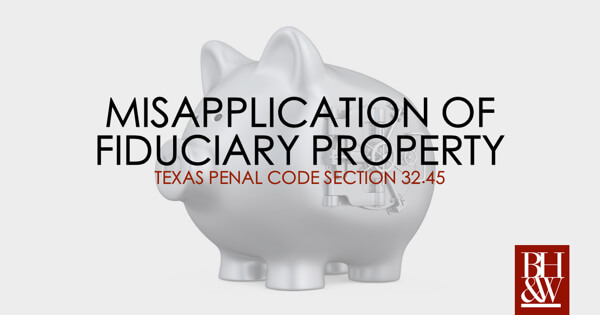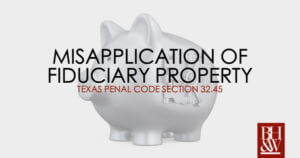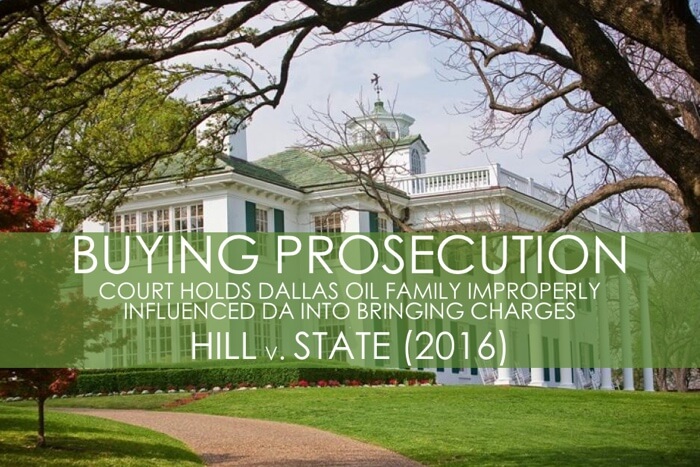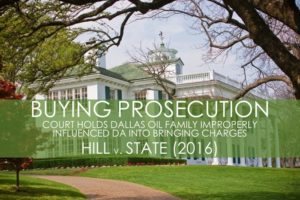
Misapplication of Fiduciary Property—What is it?
 Misapplication of fiduciary property is a charge that is aimed at protecting beneficiaries of trusts, estates, receiverships and the like. Pursuant to Section 32.45 of the Texas Penal Code, a person commits the offense of misapplication of fiduciary property by intentionally, knowingly, or recklessly misapplying property he holds as a fiduciary in a manner that involves substantial risk of loss to the owner of the property. Tex. Penal Code Ann. § 32.45(b). “Substantial risk of loss” means a real possibility of loss. Casillas v. State, 733 S.W.2d 158, 163¬–64 (Tex. Crim. App. 1986). However, the possibility need not rise to the level of a substantial certainty (which is required for theft)—the risk of loss need only be more likely than not. Id.
Misapplication of fiduciary property is a charge that is aimed at protecting beneficiaries of trusts, estates, receiverships and the like. Pursuant to Section 32.45 of the Texas Penal Code, a person commits the offense of misapplication of fiduciary property by intentionally, knowingly, or recklessly misapplying property he holds as a fiduciary in a manner that involves substantial risk of loss to the owner of the property. Tex. Penal Code Ann. § 32.45(b). “Substantial risk of loss” means a real possibility of loss. Casillas v. State, 733 S.W.2d 158, 163¬–64 (Tex. Crim. App. 1986). However, the possibility need not rise to the level of a substantial certainty (which is required for theft)—the risk of loss need only be more likely than not. Id.
Who is a “Fiduciary” Under Texas Law?
The penal code sets out four distinct groups that are considered fiduciaries pursuant to Section 32.45. These include:
- A trustee, guardian, administrator, executor, conservator, and receiver;
- An attorney in fact or agent appointed under a durable power of attorney;
- An officer, manager, employee, or agent carrying on fiduciary functions on behalf of a fiduciary; or,
- Any other person acting in a fiduciary capacity.
Id. at § 32.45(a)(1).
“Acting in a fiduciary capacity” is not defined in the penal code. However, the Texas Court of Criminal Appeals determined that because “fiduciary” has such a common meaning it should be construed according to its plain meaning. Berry v. State, 424 S.W.3d 579 (Tex. Crim. App. 2014).
The plain meaning of fiduciary means, “holding, held, or founded in trust or confidence.” More notably, a person who acts as a fiduciary is one “who has a duty, created by his own undertaking, to act primarily for another person’s benefit in matters connected with such undertaking.” Gonzalez v. State, 954 S.W.2d 98, 103 (Tex. App.—San Antonio 1997, no pet.). For example, courts have held that a person acts in a fiduciary capacity “when the business which he transacts, or the money or property which he handles, is not his or for his own benefit, but for the benefit of another person as to whom he stands in a relation implying and necessitating great confidence and trust on the one part and a high degree of good faith on the other part.” Gonzalez v. State, 954 S.W.2d 98, 103 (Tex. App.—San Antonio 1997, no writ).
Additionally, a person acting in a fiduciary capacity embraces any fiduciary, including a joint adventurer or partner. Coplin v. State, 585 S.W.2d 734 (Tex. Crim. App. 1979). This does not, however, include everyday business dealings. Berry, 424 S.W.3d at 584. The Court of Criminal appeals assume such transactions are entered into for a mutual benefit and, therefore, neither party is expected to act solely for the benefit of the other. Id.
What does it mean to “Misapply” Property?
The definition of “misapply” is fairly broad under the penal code. Pursuant to Section 32.45, a person who is a fiduciary misapplies property held as a fiduciary if the person deals property contrary to:
- An agreement under which the fiduciary holds the property; or
- A law prescribing the custody or disposition of the property.
Evidence that a defendant aided another person in misapplying property is sufficient, pursuant to the law of parties, to convict a defendant of misapplication of fiduciary property—even if the defendant did not personally handle the misapplied funds. Head v. State, 299 S.W.3d 414 (Tex. App.—Houston [14th Dist.] 2009, pet. ref’d). Furthermore, a defendant need not receive a benefit in order to misapply property. Talamantez v. State, 790 S.W.2d 33,37 (Tex. App.—San Antonio 1990, pet. Ref’d). Nor does it matter if a defendant donated the property to charity. Little v. State, 699 S.W.2d 316, 318 (Tex. App.—San Antonio 1985, no pet.).
Therefore, misapplication can occur by an omission or failure to act where a duty to act exists. Coleman v. State, 131 S.W.3d 303, 309-10 (Tex. App.—Corpus Christi 2004, pet. ref’d).
What does it take to Prove up an Agreement?
The government must prove the defendant knew of the agreement for misapplication to occur. Amaya v. State, 733 S.W.2d 168 (Tex. Crim. App. 1986). But, similar to “fiduciary,” Section 32.45 does not define “agreement.” Thus, the Court of Criminal Appeals construes agreement according to its plain meaning. Bynum v. State, 711 S.W.2d 321, 323 (Tex. App.—Amarillo 1986), aff’d, 767 S.W.2d 769 (Tex. Crim. App. 1989). To prove up an agreement, the State must be able to demonstrate a harmonious understanding or an arrangement, between two or more parties, as to a course of action. Id. Additionally, there is nothing in Section 32.45 that requires the agreement to be in writing or proved directly. Id.
Possible Defenses?
An effective defense to a charge of misapplication of fiduciary property is mistake of fact—otherwise negating the culpability required for the commission of the offense. Section 32.45 is designed to punish intentional, knowing or reckless misapplication of property. Thus, if it can be proved that the improper use or application of the property was the result of mere negligence, by mistake of fact, the statute will not apply. Other defense vary depending on the facts of the case.
What are the Penalties?
Texas has broad laws governing the use of property by a fiduciary. The charges can range from a Class C misdemeanor to a first-degree felony, based on the amount or value of property that is “misapplied.”
According to the Texas value ladder, an offense under this section is a:
- Class C misdemeanor if the value of the property misapplied is less than $100;
- Class B misdemeanor if the value of the property misapplied is $100 or more but less than $750;
- Class A misdemeanor if the value of the property misapplied is $750 or more but less than $2,500;
- State Jail Felony if the value of the property misapplied is $2,500 or more but less than $30,000;
- Felony of the third degree if the value of the property misapplied is $30,000 or more but less than $150,000;
- Felony of the second degree if the value of the property misapplied is $150,000 or more but less than $300,000; or
- Felony of the first degree if the value of the property misapplied is $300,000 or more.
Id. at § 32.45(c).
Moreover, there is also an additional enhancement (to the next higher category) if it can be shown that the beneficiary was a person 65 years or older. § 32.45(d).
When Does Misapplication of Fiduciary Property Usually Occur?
This charge can arise in several different contexts. To name a few, misapplication of fiduciary property can occur:
- When trustees misapply trust property;
- When the holder of power of attorney makes a gift to herself;
- When a business partner improperly diverts funds for personal use; or,
- When an attorney misapplies a client’s funds.
These examples demonstrate that Section 32.45 covers many situations and may result in serious consequences. Thus, if you are under investigation or have been charged with the offense of misapplication of fiduciary property, it is necessary you seek help.
Misapplication of Fiduciary Property Defense Attorneys
Our criminal defense team handles Misapplication of Fiduciary Property cases in Tarrant County, Texas and surrounding areas. If you are under investigation for w financial crime or white collar offense, contact our firm today for a free case evaluation.


 On September 21st the Texas Court of Criminal Appeals issued a decision on the oil tycoon heir Albert Hill III’s criminal appeal. The question the Court faced was whether it was in the trial court’s discretion to conduct a pretrial evidentiary hearing on Hill’s motions to quash and dismiss based on prosecutorial vindictiveness. The Court determined that it was within the trial court’s discretion to conduct such a pretrial evidentiary hearing and that discretion was not limited by the defendant meeting “a certain threshold evidentiary requirement.”
On September 21st the Texas Court of Criminal Appeals issued a decision on the oil tycoon heir Albert Hill III’s criminal appeal. The question the Court faced was whether it was in the trial court’s discretion to conduct a pretrial evidentiary hearing on Hill’s motions to quash and dismiss based on prosecutorial vindictiveness. The Court determined that it was within the trial court’s discretion to conduct such a pretrial evidentiary hearing and that discretion was not limited by the defendant meeting “a certain threshold evidentiary requirement.”





